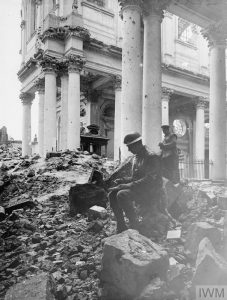In early May 1917, Peirs and his men were training. This word comes up a lot in his letters and he gives very little details to his family as to what ‘training’ actually is or means. In part, this is because he can’t discuss details of their military operations without incurring the wrath of the censor. Yet, there might be another angle here, one that is pretty common in war correspondence. Peirs often writes home about subjects that he thinks his family wants to know about. He writes about his health, food, baths, entertainment, the French ‘natives’ he encounters, etc. In short, he writes home the same kinds of things that he would if he were on holiday. When he does write about military life, it is usually to convey a funny anecdote or to reassure his family that he is okay (again, like he would do if he was on holiday in an area that suffered an earthquake, hurricane, etc. ‘I’m fine, mother, but let me tell you about this amazing thing that happened during the tornado …’).

DESTRUCTION ON THE WESTERN FRONT, 1914-1918 (Q 10286) British soldiers writing on slabs of fallen stone in Arras Cathedral, 2 March 1918. Copyright: © IWM. Original Source: http://www.iwm.org.uk/collections/item/object/205245996
Earlier today I was thinking about what Peirs and his men went through in 1916 and 1917 and the ways that he frames the war to his relatives. His 1917 correspondence reminded me of a part of Samuel Hynes’s book The Soldiers’ Tale, a book on war writing that I use in my classes. In his first chapter, Hynes discusses how war writing (and by this his means first person experiential accounts – memoirs or novels mostly – written by eyewitnesses) is ‘something like travel writing, something like autobiography, something like history.’ He writes, ‘It’s like travel writing because wars are usually fought somewhere else, in places that are unfamiliar and odd to ordinary soldiers – on islands, in deserts, over mountains, in ruined landscapes that are nothing like they knew back home.’ (5) Indeed, Jack Peirs spends a lot of time conveying the alien aspects of his experiences in ways that his parents would understand: he discusses the war through a suburban middle class English lens.
But he also does something else in writing home about his ‘adventures’ at the front. Hynes’s work is revealing here too. He continues that war writing is different than travel writing because its not really meant to make you understand what is being described. He writes, ‘though they [war narratives] make war vivid, they don’t make it familiar. One motive for writing them seems to be to show how unfamiliar war is, how strange and desolate its ordinary scenes are.’ (6) Of course, Hynes is writing about narrative and reflective prose, but there are glimpses of this process working with Peirs’s letters. He wants to reassure his parents, he wants to tell them a little about what he’s up to, but he knows that they can’t understand and I suspect he doesn’t really want them to.
In the spring of 1917, Peirs and his men fought at Arras in April and then ended up back at the Ypres Salient in May. Ypres was a place well known to them; they had been in and out of the trenches there before and had suffered many casualties in a gas attack there in 1916. As his men were in trenches near Hooge, they fought back two German trench raids in the early hours of 16 May and 19 May. Each attack consisted of German soldiers creeping up to their trenches around 3AM, bombing them, and entering their trenches looking to take prisoners for reconnaissance.
Peirs doesn’t write home during these attacks, but you will read this week how he describes the raids to his family. Do so keeping in mind the stuff about travel writing and feel free to let us know what you think he’s is and isn’t trying to say.
Source: Samuel Hynes, The Soldiers’ Tale (NY: Viking, 1997).
